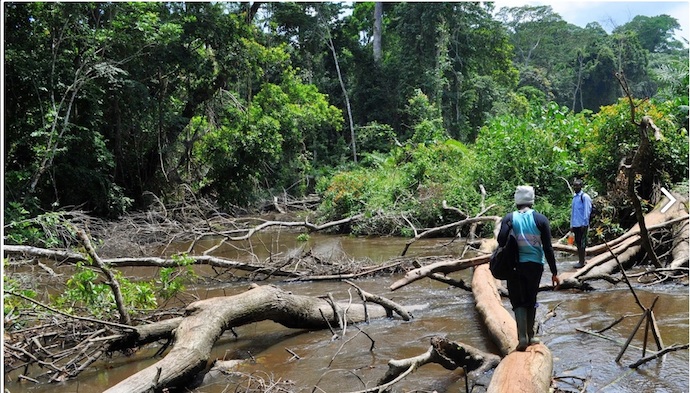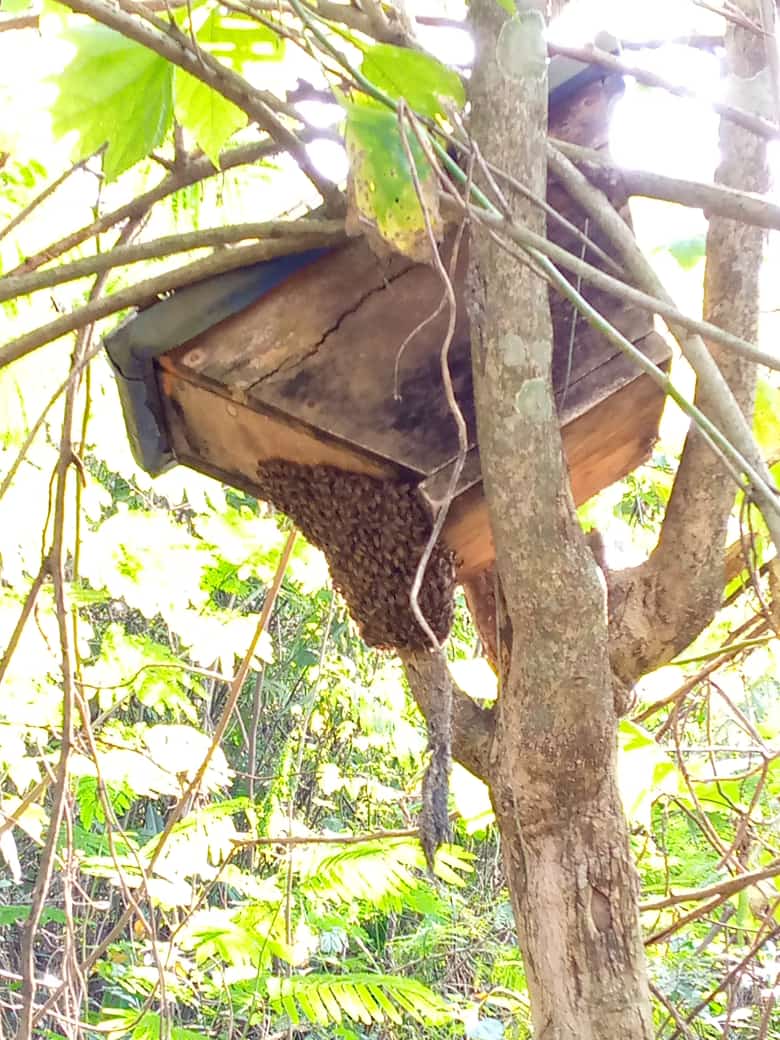
By Elias Ntungwe Ngalame
Home to chimpanzees, western lowland gorillas and forest elephants, this UNESCO World Heritage Site is threatened by commercial bush meat trade and illegal logging. A week-long trek preceded by a great ape conservation meeting in Yaounde, organised by the African Wildlife Foundation Conservationists from Central and West Africa took place on April 25, 2015.
Conservationists in the region embarked on a week-long trek through Cameroon’s Dja Faunal Reserve to determine levels of biodiversity and human activity in the UNESCO World Heritage Site. The 526,000-ha site is one of the largest and most intact rainforests in Africa and is home to populations of central chimpanzees, western lowland gorillas, forest elephants and other wildlife. Surrounded by logging and mining concessions, human settlements and agro-forestry areas, the reserve and its inhabitants are increasingly threatened by bushmeat hunting and illegal logging experts say.
“Though a World Heritage Site, very little is known about what is at the centre of this reserve,” says Jef Dupain, technical director for Central and West Africa for the African Wildlife Foundation.
“This trek will help to dispel some of the mystery in Dja and gain us a better understanding as to how the reserve is being illegally accessed and used by people,” says Dupain. “Given the poaching pressures, we don’t know the density of wildlife in the reserve. We hear conflicting accounts, with some people telling us there are plenty of forest elephants while others tell us elephant numbers have declined significantly. Now we’ll have a chance to see with our own eyes.”
Through its African Apes Initiative, the African Wildlife Foundation (AWF) is working with the Dja Conservation Service, the reserve’s managing authority, to improve ecological monitoring and law enforcement across the protected area. Training and data-driven technology provided by AWF have streamlined patrol planning in Dja, allowing rangers to maximize efficiency and effectiveness in the field. Last year, rangers destroyed 200 hunting camps, confiscated 400 snares and 31 guns, and arrested 35 poachers in the eastern part of the reserve.
This likely only represents a fraction of the overall poaching problem, however, given bushmeat and ivory continue to be confiscated by Cameroonian authorities.
According to Roger Bruno Tabue Mbobda, Dja’s resident ecologist, in spite of the threats, Dja is a living laboratory that contains a variety of habitat types and some 300 species of plants and more than 100 mammal species.
“Because of poaching and the destruction of natural habitat, some people think today the reserve is an empty shell,” says Tabue Mbobda. “But through the ecological monitoring and anti-poaching activities supported technically and financially by AWF, the service has been able to highlight the presence of several groups of gorillas, chimpanzees and African elephant, which continue to perpetuate the ecological processes in this forest block.”
The south–north trek is the first time ever outside conservationists will cross the Dja Faunal Reserve. At the same time, a second team of rangers and partners will undergo ecological monitoring training in the northern part of the reserve using rugged handheld computers installed with CyberTracker software.
Great ape workshop Prior to the reserve trek, conservationists and protected area representatives from Cameroon, Senegal and the Democratic Republic of Congo will gather in Yaounde for a two-day workshop aimed at facilitating partnership, communication and collaboration among great ape conservation stakeholders. The workshop, funded by the Arcus Foundation, is the second workshop to convene protected area authorities, rangers, NGOs and researchers from great ape sites in Central and West Africa, following a first workshop held last year in Kinshasa.
“Sharing learning and experiences between sites is critical to strengthen conservation practice,” says Annette Lanjow, Arcus Foundation vice president of strategic initiatives and the great apes program. “What is also important, however, is developing a community of practitioners, who know and trust each other, and who can reach out for advice or input and who can collaborate on shared conservation challenges. These workshops and field visits develop such a community amongst African conservationists, and we feel that this is essential for the future.”
Underscoring the importance of the workshop within Cameroon, the Secretary General of the Ministry of Forestry and Wildlife will preside over the two-day event, accompanied by other officials, including the ministry’s Director of Fauna and Protected Areas.










